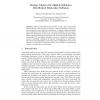Free Online Productivity Tools
i2Speak
i2Symbol
i2OCR
iTex2Img
iWeb2Print
iWeb2Shot
i2Type
iPdf2Split
iPdf2Merge
i2Bopomofo
i2Arabic
i2Style
i2Image
i2PDF
iLatex2Rtf
Sci2ools
118
click to vote
ISOLA
2010
Springer
2010
Springer
Design Choices for High-Confidence Distributed Real-Time Software
Safety-critical distributed real-time systems, such as networked medical devices, must operate according to their specification, because incorrect behaviour can have fatal consequences. A system's design and architecture influences how difficult it is to provide confidence that the system follows the specification. In this work, we summarize and discuss three design choices and the underlying concepts that aim at increasing predictability and analyzability. We investigate mandatory resource reservation to guarantee resource availability, separation of resource consumptions to better manage resource inter-dependency, and enumerative reconfiguration. We use the example of a distributed monitoring system for the human cardiovascular system to substantiate our arguments.
Related Content
| Added | 13 Feb 2011 |
| Updated | 13 Feb 2011 |
| Type | Journal |
| Year | 2010 |
| Where | ISOLA |
| Authors | Sebastian Fischmeister, Akramul Azim |
Comments (0)

